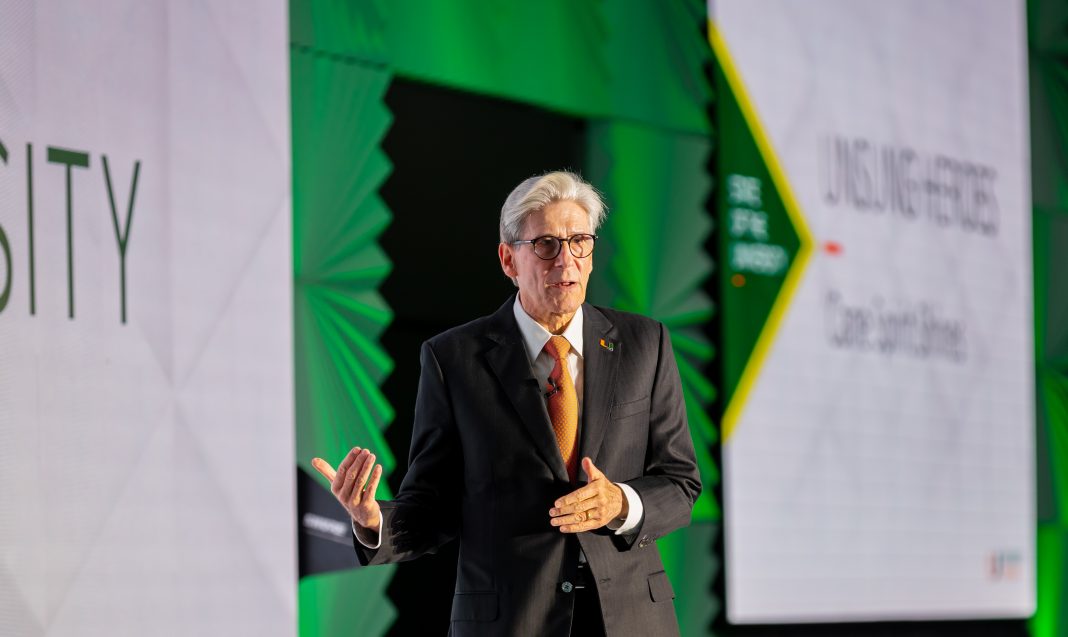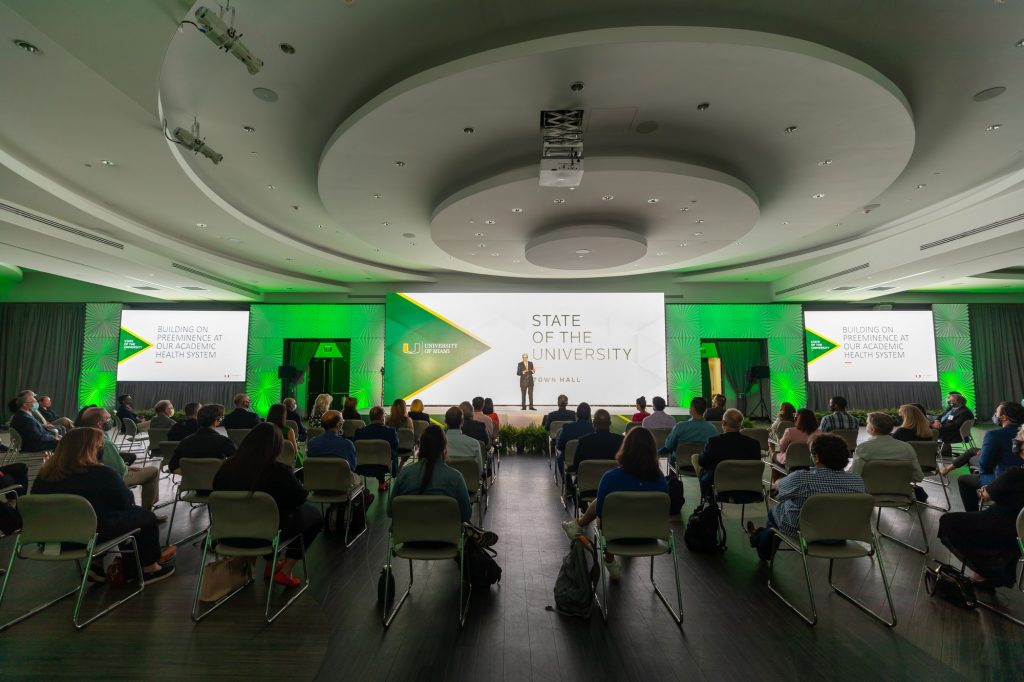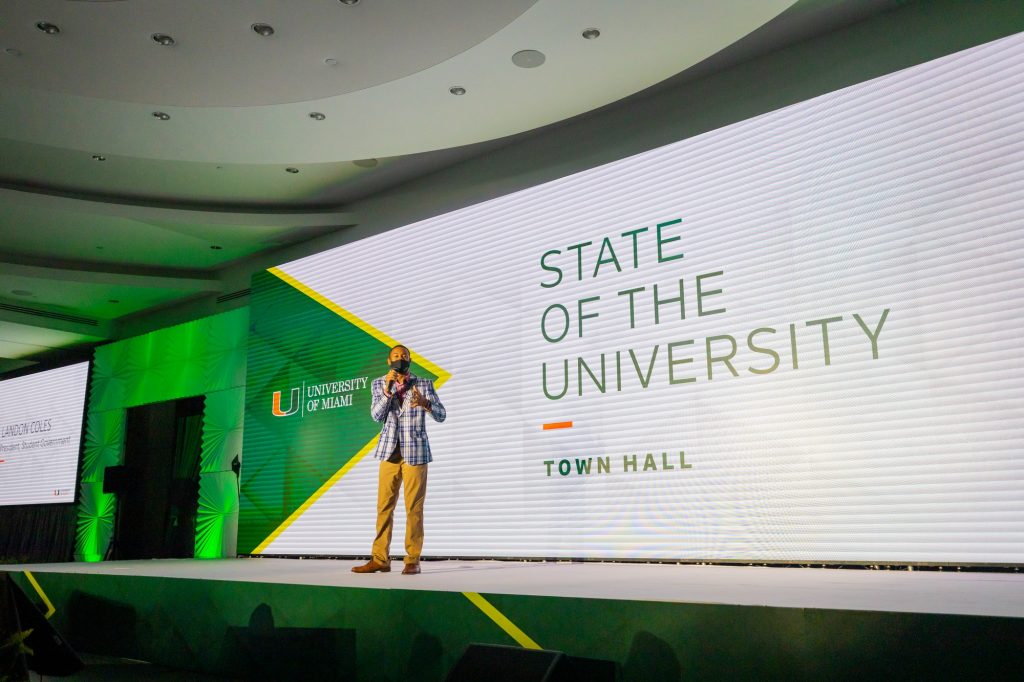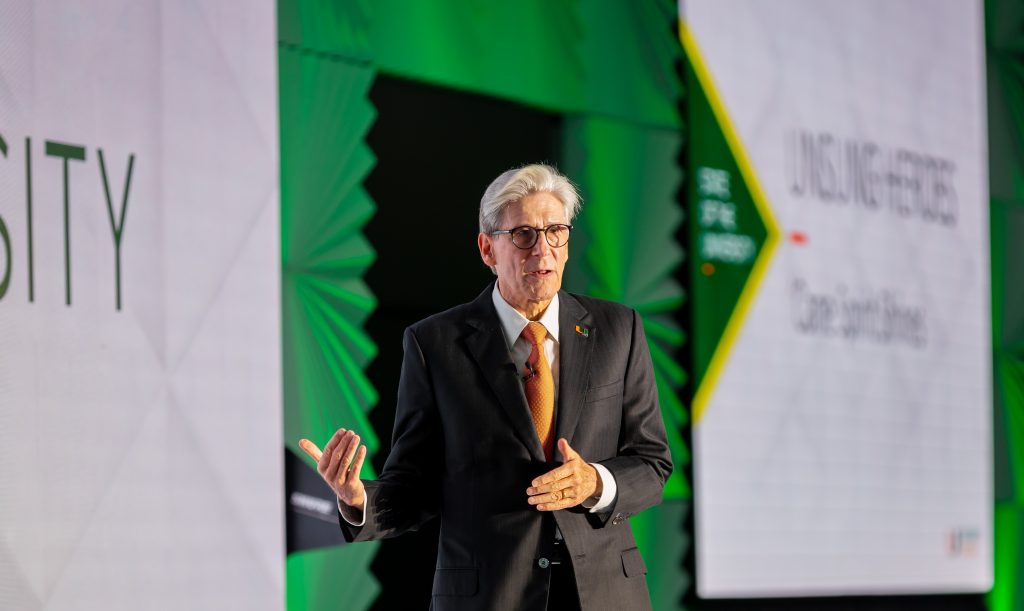
The University of Miami returned with the first in-person edition of ‘State of the University’ since the start of the pandemic Tuesday. The town hall and panel-based discussion saw university leaders discuss issues like public health, racial discrimination and social justice.

The risk of spreading COVID-19 made in-person town halls impossible in 2020, but with a lower case count this semester, UM provided the university community the option to attend in person or virtually. Many students and faculty still utilized the online format.
Student Government President Landon Coles started the event by greeting audience members and reflecting on the transformative events that shaped the 2020-21 academic year.
“More than 2,000 of us are gathered here, a majority online, to reflect on the state of the University of Miami,” Coles said.
“COVID-19 lockdowns, Black Lives Matter, George Floyd, Breanna Taylor, a financial crisis, Asian hate, ‘Viva Cuba Libre’, mass migration,” Coles said. “We find ourselves in a world very different from the one where we hosted our last ‘State of the U’ in 2019, a world forevermore shifted by seismic events, movements and points of inflection,” he continued.
Coles highlighted his work with UM’s student government and their advocacy on behalf of university students.
“It is my privilege to represent a student body that has remained steadfast and demanding progress for ourselves, for our university community and for our local and global neighbors,” Coles said. “We have used our voice to insist, at the very best of our institution, and the movement does not cease here.”

Impact of COVID-19
UM President Julio Frenk echoed Coles’ sentiment in his opening statement, reflecting on the hardships the world has endured since 2019.
“None of us knew just how soon the community would be called to endure and just how strong we would grow,” Frenk said.
Frenk continued by explaining three decisions made by the university in response to the obstacles faced during the 2020 academic year.
“We made hundreds of decisions over the course of the last two years, but there are three in particular that capture our commitment to endure,” Frenk said.
The first two decisions, he said, were for UM’s health system to resume seeing non-COVID-19 patients and for the university to begin offering students the choice to return to in-person learning starting in fall 2020.
Frenk thanked the commitment and cooperation of UM’s faculty, staff, students and community in being able to maintain an in-person campus option when many schools continued exclusively online.
“We did so successfully, beginning and ending an academic year, a full academic year, with zero documented cases of in-classroom coronavirus transmission,” Frenk said.
The third decision was the resumption of intercollegiate athletics.
“Let us play was more than a catchy hashtag generated by student athletes,” Frenk said. “It underscored what my professional training confirmed, that our athletes were safer in the rigor and routine of competing, and they could provide a powerful example for both students and fans to follow.”
Racial injustice
Frenk then discussed the racial division across the country and protests that started in the summer of 2020 and UM’s efforts to help the POC community.
“We committed to being intentional and passionate in our efforts to help our community begin to heal,” Frenk said. “Together, we unveiled a 15 point action plan to advance racial justice.”

Frenk highlighted university efforts to further the recruitment of Black faculty. On average, UM hires around two to five faculty members per academic year, Frenk said. This academic year, the university has hired 14 Black faculty members, Frenk said.
“Diversity contributes to excellence, and we will continue to attract the most talented people of every background to Miami,” President Frenk said.
Frenk then announced the creation of a new center for global Black studies, planned to launch later this year, which will be located on the third floor of the Merrick building on UM’s Coral Gables campus.
“The center will offer a unifying platform to advance understanding of racism and other challenges facing the black diaspora around the world, especially in our hemisphere,” Frenk said. “Our students will work together to model what it looks like to embrace our identities while exploring and respecting those of others.”
The panel
The panel was made up of four faculty members and one biomedical engineering student. Each had approximately 15 minutes to answer questions from the audience.
Dr. Willis Jones, an associate professor of higher education, highlighted the importance of innovation and nontraditional learning methods for the next generation of students.
“When people think about the question of innovation, they certainly first go to teaching, and then they go to research, and both of those things are incredibly important and do things that this university has invested in,” Jones said.
“But I also think the truly innovative universities think about innovation across all of their functional areas. So, when we think about the co-curriculum, how are we being creative on things like study abroad or other co-curricular activities?” Jones continued.
Jones then spoke on the likelihood that university graduates follow career paths different from their area of study.
“I read the data somewhere that suggests that the average college graduate today is going to have 12 to 15 different jobs in their lifetime, and they’re probably going to go through three, four, maybe five different career paths,” Jones said. “Most of those careers don’t exist right now.”
Jones promoted an interdisciplinary approach to student learning, explaining the possible benefit of students in the school of education taking computer science or economic courses as an example.
Dr. Yelena Yesha, head of international collaborations for the Institute of Data Science and Computing, elaborated on taking an interdisciplinary approach to learning.
“There is no progress without innovation, so dream big and take a risk,” Yesha said.
President Frenk ended the event by thanking attendees both in-person and online for continuing the town hall tradition and bringing the community together to reflect and discuss ways to better the university.
“I look forward with great optimism, great determination to our community’s ever-brighter future,” Frenk said.





